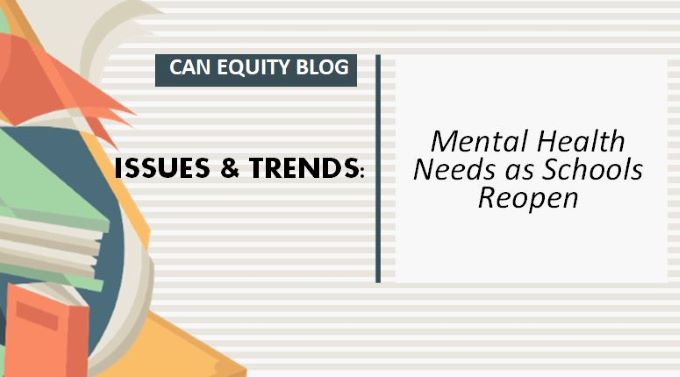
ISSUES & TRENDS: Mental Health Needs as Schools Reopen
The COVID-19 pandemic continues to have a huge impact on families, children, and communities emotionally, financially, and physically for some as schools are grappling with discussions on when to open schools. We have already discussed the impacts of COVID-19 on immigrants, Black, Latinx, and Asian American communities, but we have yet to discuss on our equity blog the impact of COVID-19 on our communities’ children and youth. Distance learning, loss of special school milestones, being away from friends, anxiety about grades, returning to school, lack of access extracurricular activities, lack of health supports, and, in some cases, being in conditions that are not safe and secure.
COVID-19 has drastically changed our youth’s reality and schools should expect to see heightened levels of anxiety and trauma in our youth. Simultaneously, the United States is experiencing a time of civil unrest as protests for racial justice and equity continue to take place in response to the unjust killing of black people at the hands of police. Some of these protests are happening right here in Austin. Families, youth, and communities may be emotionally impacted by this as well. As schools plan to reopen, they should consider these circumstances and understand they will need more than the normal amount of mental health resources to respond to and address the needs of their student body and staff.
Schools are already understaffed when it comes to mental health staff/programs and, now, budget cuts are looming. Increasing mental health resources and response will take an approach that involves the whole school and whole community to ensure that, when schools reopen, everyone is safe and has access to the mental health resources they need.
In a blog post published by Child Trends in July, they suggest that the approach to addressing this community challenge includes:
- educating school staff about trauma and mental health;
- acknowledge the disparities in the impact of COVID-19 by race and trauma related to ongoing nationwide protests about unjust killings of black people;
- ensuring that all staff know how to connect students to mental health services that are culturally and linguistically appropriate;
- creating a safe and supportive learning environment using social emotional learning (SEL) curriculum;
- addressing and supporting the mental health needs of school staff; and
- involving the community in supporting students and staff.
This approach would require a school culture that prioritizes the mental wellness of all students and staff. It would need to utilize community based mental health supports to provide services to children and youth like Communities in Schools, Integral Care, Excellence and Advancement Foundation, etc. Mental health programs and frameworks that are built into how the school functions and communicates with each other, students, parents, and the community. It would require intentional training on what trauma is, how to spot it, and how to be trauma informed. The community capacity to address trauma and mental health can be acquired locally through organizations like the Trauma Informed Care Consortium, Youth Substance Abuse Prevention Coalition, Austin Child Guidance Center, and Kids Living Well. It would require special attention to school staff. The focus should not only be to help teachers and other schools staff on strategies for best supporting their students, but also how to deal with some of the things they may have experienced and/or are experiencing due to COVID-19 or racism. Through community partnerships it can be possible to provide the mental health support needed in schools as children, youth, and teachers return to campus in the midst of a global pandemic and civil unrest relating to racial inequality.
For more information about interventions listed in the Child Trends Inc article, visit https://www.childtrends.org/blog/as-schools-reopen-addressing-covid-19-related-trauma-and-mental-health-issues-will-take-more-than-mental-health-services
To find out information on your school districts status on reopening visit:
Austin ISD https://www.austinisd.org/covid19/communications/reopening
Manor ISD https://www.manorisd.net/coronavirus
Hays CISD https://www.hayscisd.net/Page/11179
Eanes ISD https://www.eanesisd.net/r2r
Leander ISD https://support.leanderisd.org/support/covid-19/
Pflugerville ISD https://www.pfisd.net/Page/7802
Del Valle ISD https://www.dvisd.net/back-to-school/
Jelina Tunstill, CAN Program Coordinator